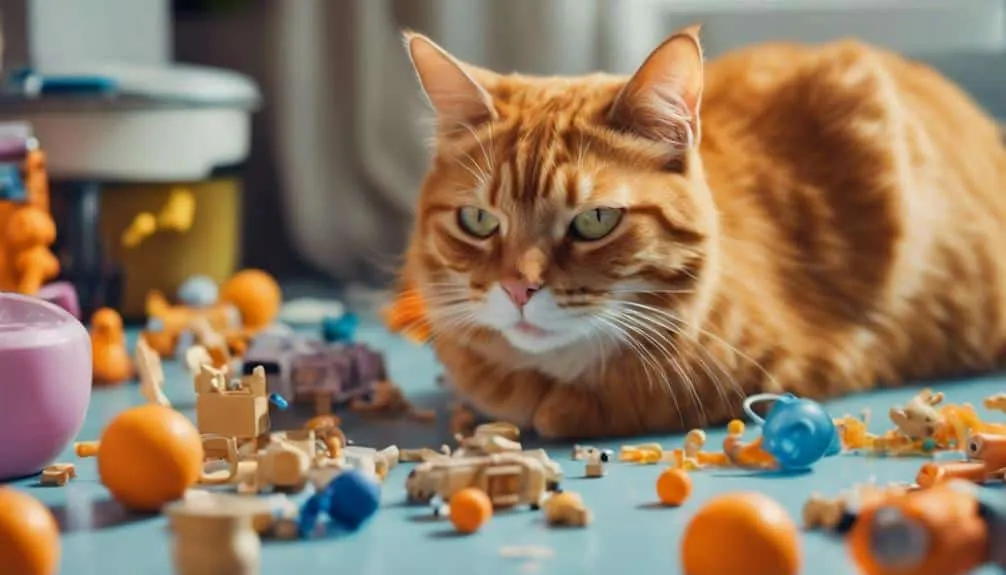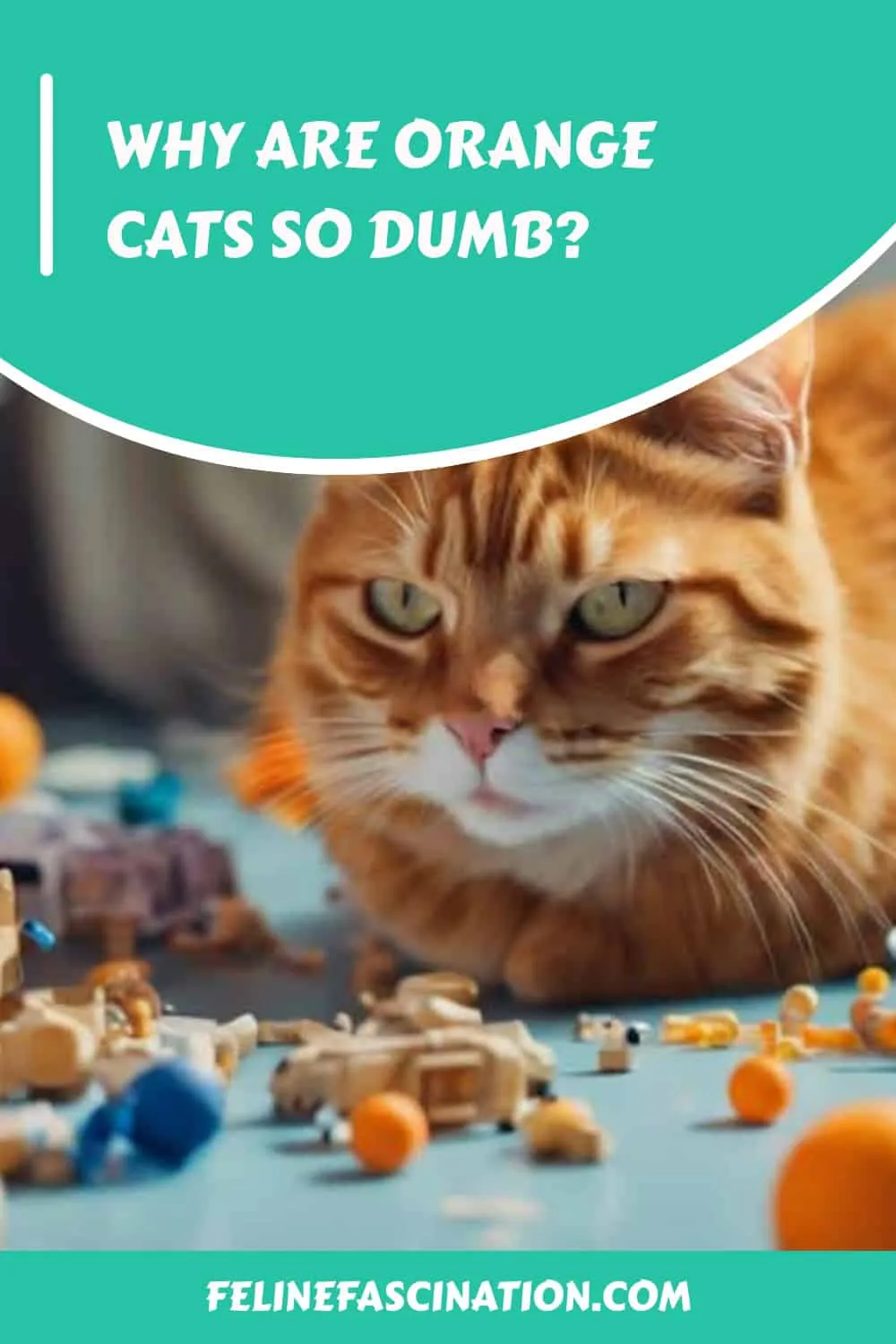The Best Fluffy Pancakes recipe you will fall in love with. Full of tips and tricks to help you make the best pancakes.

Curious about why orange cats are often labeled as "dumb"? While commonly perceived as less intelligent, the truth behind their cognitive abilities might surprise you. Exploring the factors influencing this stereotype could shed light on a fascinating aspect of feline behavior that challenges preconceived notions. Stay tuned to uncover the real story behind the intelligence of orange cats and gain a fresh perspective on these vibrant felines.
Key Takeaways
- No scientific evidence supports claims of lower intelligence in orange cats.
- Intelligence stereotypes based on fur color lack empirical support.
- Behavioral studies show cognitive abilities in cats regardless of color.
- Genetics, environment, and individual traits influence intelligence levels.
- Understanding intelligence requires observation, interaction, and enrichment.
The Science Behind Orange Cat Genetics
Orange cat genetics play a significant role in determining the unique coat color and personality traits of these feline companions. Genetic inheritance is the key factor in the color variations seen in orange cats. The gene responsible for their distinctive hue is the 'O' gene, which codes for the production of orange pigment known as pheomelanin. This gene is carried on the X chromosome, making the inheritance of orange fur a more common occurrence in male cats, as they only need one copy of the gene. Female cats, on the other hand, require two copies to display the orange color.
Color variations in orange cats can range from a deep reddish-orange to a paler cream color, with some cats even exhibiting tabby stripes or spots. These variations are a result of genetic mutations and the interaction of different genes affecting coat color. Understanding the genetic basis of these traits can provide valuable insights into the diversity observed among orange cats.
Debunking Myths About Orange Cats
Common misconceptions surrounding the intelligence of ginger felines warrant a closer examination to separate fact from fiction. Orange cat myths often perpetuate the idea that these cats are less intelligent than others solely based on their fur color. However, there's no scientific evidence to support this claim. Intelligence stereotypes associated with orange cats are unfounded and unfair. Cats, regardless of their color, exhibit a wide range of cognitive abilities and behaviors that aren't linked to their fur pigmentation.
It is crucial to debunk these myths to make certain that orange cats aren't unfairly judged or treated differently based on inaccurate stereotypes. Each cat is an individual with its own unique personality, intelligence, and capabilities. By dispelling these myths, we can appreciate and celebrate the diversity and individuality of all cats, including those with vibrant orange coats. Let's focus on understanding and appreciating these magnificent creatures for who they are, rather than making assumptions based on unfounded beliefs.
Factors Influencing Orange Cat Behavior
What factors contribute to shaping the behavior of ginger cats? Orange cats, often referred to as ginger cats, possess distinct personality traits that influence their behavior. In pop culture, orange cats are often depicted as playful, outgoing, and affectionate. These characteristics stem from their genetic makeup and upbringing.
Orange cat personality traits can vary from one cat to another, but some common traits include being social, vocal, and curious. These traits often make orange cats friendly companions that enjoy human interaction. Additionally, their energetic and playful nature can lead to mischievous behavior at times. Understanding these traits can help owners provide suitable enrichment and interaction for their orange feline friends.
Factors such as genetics, environment, and early socialization play significant roles in shaping orange cat behavior. While stereotypes may portray orange cats as less intelligent, their behavior is more a result of their unique traits rather than their intelligence levels. By recognizing and appreciating these traits, owners can create a fulfilling and enriching environment for their orange cats.
Are Orange Cats Actually Less Intelligent?
Research findings suggest that the intelligence levels of orange cats may not align with common stereotypes. Intelligence assessment of cats, including orange cats, is a complex subject that necessitates a combination of behavioral studies and observation. While some may believe that orange cats are less intelligent based on their playful or mischievous behavior, it's crucial to take into account various factors that influence these behaviors.
Behavioral studies have shown that cats, regardless of their color, exhibit a range of cognitive abilities. These studies indicate that cats are adept problem solvers, have excellent memory retention, and possess a high level of curiosity. Intelligence in cats isn't solely determined by color but rather a combination of genetics, environmental factors, and individual personality traits. Orange cats, like their counterparts of different colors, can display a wide range of intelligence levels.
Understanding your orange cat's unique intelligence requires patience, observation, and interaction. By engaging in stimulating activities, providing enrichment opportunities, and forming a strong bond with your feline companion, you can better appreciate and nurture their cognitive abilities.
Tips for Understanding Your Orange Cat
To better understand your orange cat's behavior and needs, focus on observing and responding to their unique characteristics and preferences. Orange cats, like all felines, have distinct traits that can help you build a strong bond with them. Here are some tips to enhance your understanding of your orange cat:
- Bonding techniques: Spend quality time with your cat, engage in interactive play sessions, provide treats, and create a safe and comfortable environment to strengthen your bond.
- Behavioral quirks: Orange cats may exhibit specific behaviors such as kneading, head-butting, or vocalizing more than other cats. Understanding and accepting these quirks can help you communicate better with your feline friend.
- Observation is key: Pay attention to your cat's body language, vocalizations, and reactions to different stimuli to decipher their feelings and needs accurately.
- Respect their space: Allow your orange cat to have their alone time and personal space when needed to prevent stress or anxiety.
- Consistent routine: Establish a consistent feeding schedule, playtime, and grooming routine to provide stability and predictability for your orange cat.
Frequently Asked Questions
Do Orange Cats Have a Specific Personality Trait?
Orange cats do not possess a specific personality trait solely based on their color. Their behavior traits and intelligence levels vary like any other cat. Color impact on personality quirks is not scientifically proven.
Can an Orange Cat's Color Affect Its Intelligence?
The color impact on an orange cat's intelligence is a debated topic. While some believe color doesn't affect intelligence, others suggest that genetics and environment play a more significant role in determining a cat's smarts.
Are Orange Cats More Prone to Certain Health Issues?
Health concerns in orange cats can stem from genetic factors like higher predisposition to certain issues. Behavioral tendencies and environmental influences can also play a role. Regular vet check-ups and a healthy lifestyle can help mitigate risks.
Do Orange Cats Require Different Care Compared to Other Colors?
When it comes to caring for your orange feline friend, remember to pay attention to their specific grooming needs and dietary requirements. Behavioral training and environmental enrichment play a key role in keeping them happy and healthy.
What Is the History Behind the Association of Orange Cats With Being Less Intelligent?
Orange cats' reputation for lower intelligence stems from historical stereotypes rather than scientific evidence. While breed and individual temperament play a role, color does not directly impact intellectual abilities. Genetic predisposition influences behavior more than fur color.
Conclusion
To sum up, dispelling the myths surrounding orange cats' intelligence is crucial for promoting fair treatment and appreciation for all felines. By grasping the science behind their genetics and behavior, you can better understand and connect with your orange cat.
Remember, stereotypes based on fur color are unfounded and unfair. Treat your orange cat with the respect and care they deserve, and you'll be rewarded with a loving and intelligent companion.










